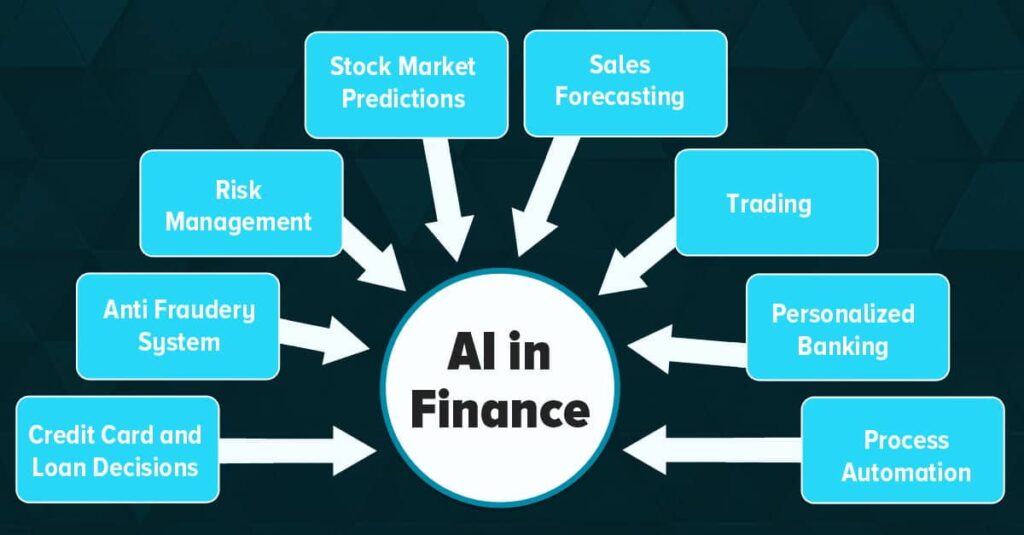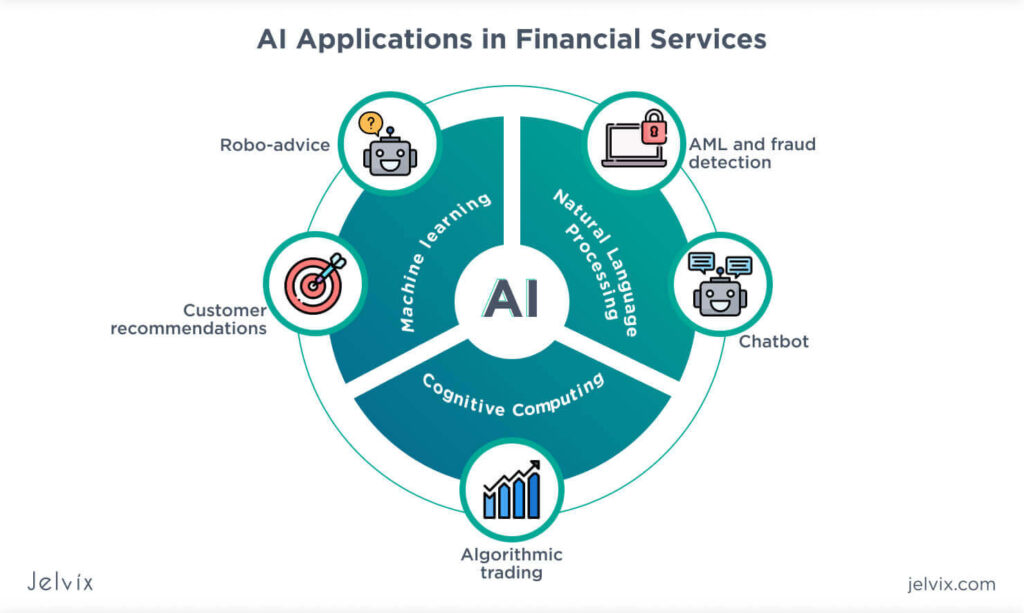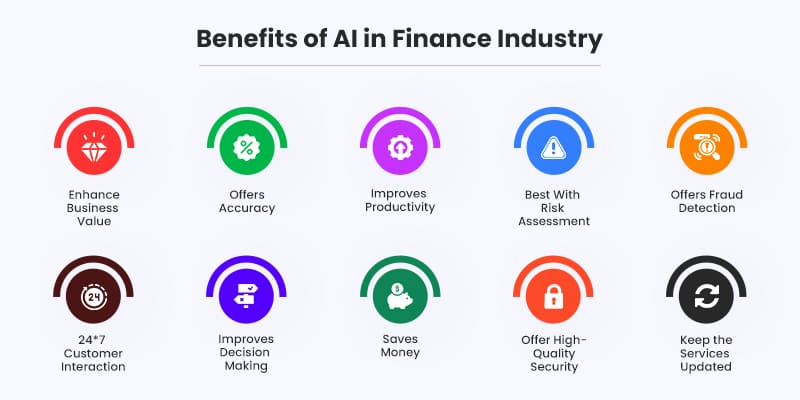Table of Contents:
Why AI Matters in Finance?
Key Applications of AI in Finance
Benefits of AI in Finance
Challenges of AI in Finance
AI has been moving forward from just another buzzword; it has become a new phenomenon in transforming the world and reshaping all industries reaching far into today’s finance. AI is the game-changer of efficiency, accuracy, and most importantly, innovation in the financial arena. Be it robo-advisors managing investments, systems designed for fraud detection in transactions, or even AI-driven predictive models for credit scoring, is enormously significant.
In this blog, we will explore how AI is revolutionizing the world of finance, what key applications it flaunts, the challenges faced, and what may lurk in the future. So, let’s see how AI is flipping the whole financial landscape upside down in a good way.
Why AI Matters in Finance?

Picture Courtesy: advansappz.com
The complex finance ecosystem demands precision, speed, and reliability. Until now, financial processes, whether personal or institutional, have been largely manual, dependent on processes often prone to inefficiencies and errors. Enter AI: a technology that provides vast quantities of data, discovers patterns, and makes decisions at incredible speeds.
Decision-Making by Data:
AI processes large numbers of financial information faster than humans and discovers insights and trends that humans would take significantly longer to identify, culminating in smarter and speedier decisions.
Cost Efficiency:
AI saves expenditure due to automation by performing repetitive processes like data entry, compliance checks, and monitoring transactions, which allow funds to unlock for strategic activities.
Improved Accuracy and Risk Management:
AI minimizes Human errors in important financial transactions. AI makes detecting deceitful activities easier and assessing risks possible, thus providing high compliance and safety.
Enhanced Customer Experience:
AI provides more personalized financial services, tailored investment advice to instant customer support through a chatbot, making financial instruments easier for customers to use.
Innovative Financial Products:
AI creates new financial gadgets and services, such as robo-advisers, algorithmic trading, or alternative credit scoring methods, and drives growth in the industry.
Key Applications of AI in Finance:


Picture Courtesy: https://www.finalroundai.com/
Here are the key applications of AI in finance, showcasing its transformative impact across the industry:
1. Fraud Detection and Prevention:
AI monitors transactions in real time, identifies unusual patterns, and detects fraudulent activities before they cause harm. For example, MasterCard and PayPal entities try to authenticate financial transactions through AI.
2. Robo-Advisors and Wealth Management:
Robo-advisors provide AI-managed personalized investment portfolios, financial advisory services, and rebalancing of assets when market and individual risk preferences change. Betterment and Wealthfront are usually cited examples.
3. Algorithm Trading:
Artificial intelligence could analyze market data and carry out transactions in milliseconds based on analytics. Therefore, the whole system can tackle emotional biases and transactions become extremely efficient. The black rock is a giant user of AI to optimize its trading strategies.
4. Credit Scoring and Lending:
AI analyzes social media behavior and payment histories in addition to all the traditional data for credit risk evaluation. Most importantly, AI can enable faster decisions for loans as well as fairer ones. Upstart is one example of making use of such AI technology for its lending purposes.
5. Risk Management:
AI could use predictive analytics to identify potential risks, simulate financial scenarios for resilience, and dynamically adapt strategies to limit losses in turbulent markets.
Benefits of AI in Finance:


Picture Courtesy: matellio.com
The advantages of using AI in finance are compelling:
1. Efficiency Boost:
With repetitive procedures like data entry, transaction processing, and compliance checking, AI is able to speed up life for financial institutions and make them more efficient.
2. Improvement Accuracy:
AI achieves better risk management, compliance, and overall financial reliability by significantly minimizing human errors in calculations, analyses, and decision-making.
3. Cost Saving:
Operational costs are minimized through reduced employment and optimized workflows, while enabling companies to allocate resources strategically while providing services of high quality.
4. Personalized Customer Experience:
AI customizes financial goods and services to the various specific needs of different customers, offering personalized investment advice, as well as bank experiences and good customer response.
5. Fraud Detection and Security:
AI systems detect fraudulent transactions and cyber threats in real-time, enhancing the security of sensitive financial data and protecting customers and institutions from significant losses.
6. Data Driven Decisions:
With the capacity to sift through huge amounts of data, AI can give out practical business recommendations offering financial houses opportunities to make more defined investments, anticipate market movements, and streamline directions of strategies.
7. Innovations in Financial Products:
AI will move ahead in the creation of modern tools such as robo-advisors, algorithmic trading conditions, and alternative credit scoring systems, expanding the possible future of services in finance.
8. Scalability and Flexibility:
AI allows the financial infrastructure to be totally scalable and adaptive to new situations such as increased volumes of transactions or changing compliance requirements in a seamless manner.
Challenges of AI in Finance:
No revolution comes without challenges. While AI holds immense promise, it also raises concerns:
Data Privacy and Security:
AI relies heavily on data, making financial institutions vulnerable to breaches. Protecting sensitive customer data and ensuring compliance with privacy regulations like GDPR is a major concern.
Algorithmic Bias:
AI systems can inherit biases from training data, leading to unfair outcomes in areas like lending or credit scoring. Addressing and mitigating these biases is critical for ethical AI use.
Regulatory and Compliance Issues:
The fast-paced evolution of AI in finance often outpaces regulatory frameworks. Lack of clear guidelines can make compliance difficult, leading to potential legal risks for institutions.
Integration and Implementation Costs:
Adopting AI technologies requires significant investment in infrastructure, training, and resources, which can be a barrier for smaller financial institutions.
Transparency and Explainability:
AI models, especially deep learning systems, can act as “black boxes,” making it challenging to explain decisions to regulators, customers, or stakeholders.
Cybersecurity Risks:
While AI enhances security, it can also be exploited by malicious actors for sophisticated cyberattacks, requiring constant vigilance and advanced defenses.
Workforce Displacement:
AI-driven automation may lead to job displacement in routine roles, creating challenges for workforce adaptation and retraining.
Dependence on Quality Data:
AI performance is highly dependent on the quality and quantity of data. Poor or incomplete data can lead to inaccurate predictions or unreliable outcomes.
The rise of AI in finance isn’t just for corporations or Wall Street traders; it’s for everyone. Whether you’re an investor, a small business owner, or just someone managing personal finances, AI has something to offer. By embracing AI tools and understanding their potential, you can make smarter decisions and stay ahead of the curve.
Your Turn! What’s your take on AI in finance? Have you tried using any AI-powered financial tools? Share your experiences in the comments below. Let’s discuss how we can all make the most of this exciting technological revolution!
For more insights and updates on Metaverse, DeFi, Blockchain, NFT & Web3, be sure to subscribe to our newsletter. Stay informed on the latest trends and developments in the decentralized world!










